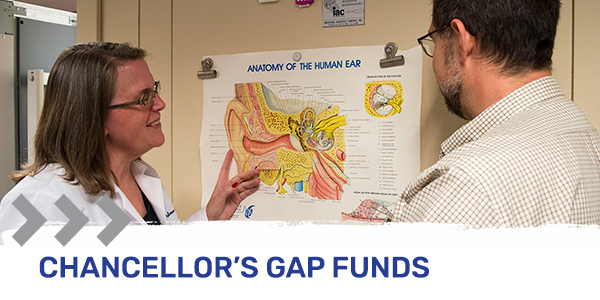Four Pitt innovation teams have been selected to receive commercialization grants from the Chancellor’s Gap Fund in order to accelerate on their path from the lab to the market.

The Chancellor’s Gap Fund was reauthorized in 2021 to provide critical bridge funding for research projects that have demonstrated strong commercialization potential, but require key proof of concept experiments or other data or prototypes in order to attract interest from potential investors or industry partners.
The fund provides grants ranging from $25,000 to $75,000, based on what is needed to advance the project through a significant milestone.
A total of $263,0000 was awarded in this cycle.
“The standard of applications remains consistently high, and we look forward to helping these teams not only reach their program goals, but also move along the path to creating significant social and financial impact as a result,” said Peter Allen, Executive Director, Innovation and Strategy, Office of Innovation and Entrepreneurship.
Expressions of interest for the next funding cycle for the Chancellor's Gap Fund will be accepted beginning in April 2022.
Innovation teams receiving awards in the current cohort include:
PACE-RTP: Perception-Action Coupling Evaluation for Return To Play
Principal Investigator:
Chris Connaboy, School of Health and Rehabilitation Sciences
Co-Investigators:
Alice LaGoy, Neuromuscular Research Laboratory; Shawn Eagle, Department of Neurological Surgery
Project Description:
Rapid and reliable method for measuring sport-related concussion
Youbiotics
Principal Investigator:
Steven Little, Swanson School of Engineering
Co-Investigators:
Matt Borelli, Swanson School of Engineering; Abhinav Acharya, Arizona State University; Jonathan Krakoff, National Institutes of Health
Project Description:
Personalized probiotics for weight management
Reusable and self-sterilizing 3D HEPA metal filters
Principal Investigator:
Markus Chmielus, Swanson School of Engineering
Project Description:
3D printed porous metal filter for use in air filtration applications in masks, room- or building-based air filtration
LiDIA: Listening, iDentification and Instant Amplification
Principal Investigator:
Catherine Palmer, School of Health and Rehabilitation Sciences
Co-Investigators:
Jeffrey Vipperman, Swanson School of Engineering; Erik Rauterkus, School of Health and Rehabilitation Sciences
Project Description:
Device for greatly broadening the identification of hearing loss that is currently untreated